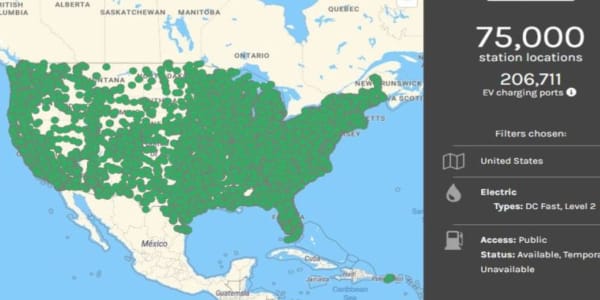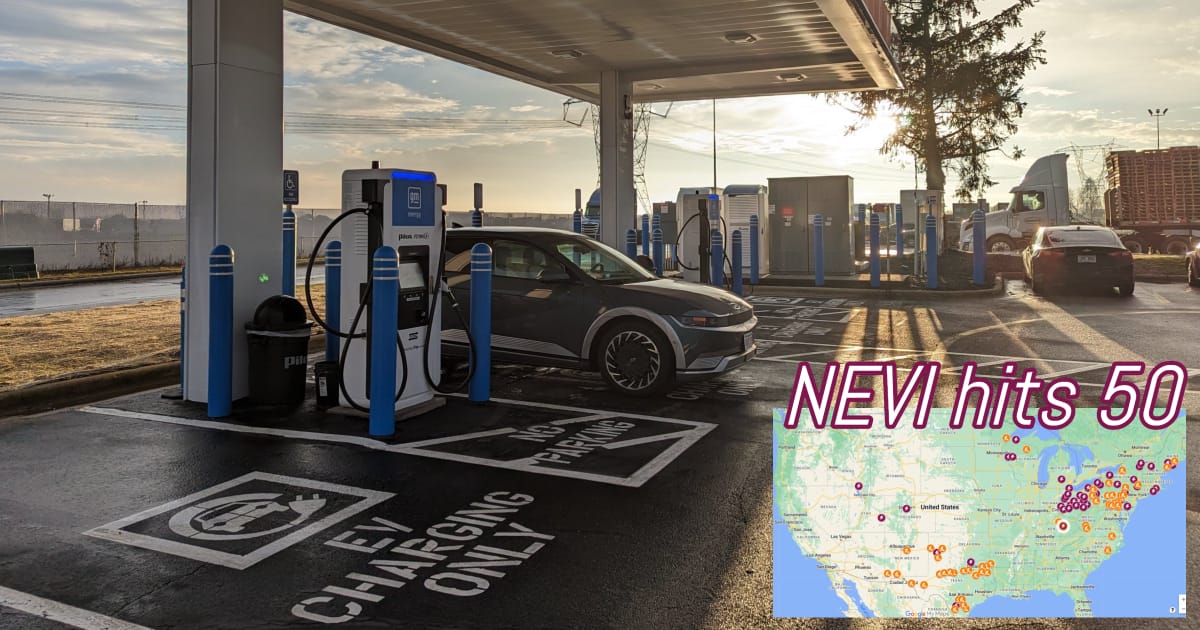
Good day, fellow appreciator of instant torque 🟢⚡
Here’s the second edition of our weekly EVI update, which still doesn’t have a better name. We’re close, though, so watch for a rebrand before the month is out.
Ahead of a change in administration, this week has seen funding fly out of Washington D.C. From CFI grants and community charging initiatives to eBike support and clean fleet funding, the list of projects is tough to summarize.
Nonetheless, let’s extract the EVI items and get a feel for how they play into wider infrastructure developments… ⤵️
Round 2 CFI Grants Reach Half the U.S.
News— The second round of federal Charging and Fueling Infrastructure (CFI) grants will create at least 11,500 new charging ports across 27 states. Round 2 follows two separate award segments in round 1 (A/B), announced in 2024.
Numbers - $636 million for 49 charging projects, across 27 states and four Tribal Nations. 51% of awards went to cities, emphasizing a shift in attention to neighborhood and workplace charging solutions for CFI, while programs like NEVI prioritize travel corridors.

New AC charging ports at Round 1 CFI-funded site - Deerfield, MA
Nuance - Funding for charging to serve neighborhood-based, multi-family projects jumped to $143 million for 16 round 2 projects. This increase of around 220% over round 1 funding underscores the growing importance of destination charging options. This round also opened to shared private locations, whereas round 1 funding required the site to be publicly accessible.
Next Up - $720 million (21%) of funding allocated to the CFI program remains to be awarded. Expect round 2B funds to be awarded in short order, with attention then shifting to completion of first-round projects and measuring their value to host communities.
Charging Vendor Spotlight: EVolve New York
News - EVolve NY, the statewide fast charging network operated by the New York Power Authority, passed 200 chargers just before the ball dropped to end 2024 on a high.
Numbers - 218 dispensers across 53 charging stations, at the most recent count, which represents around one-fifth of New York state’s high-power DC charging (150kW or more).

EVolve NY team members at Quackenbush station - Albany, NY
Nuance - Local knowledge and a team that lives with electric vehicles is the secret sauce that makes EVolve NY a blueprint for other states. The New York Power Authority (NYPA) has deployed DCFC in all corners of the state, leveraging federal funds where possible to open up new routes for EV drivers all over New York.
Next Up - Completing another 15-20 DCFC corridor sites will see the state achieve “Fully Built Out” status, opening up further funding for metro and community charging sites. A 12-stall EVolve NY charging hub is also underway at La Guardia airport in NYC.
AC/DC: Curbside Carpe Diem
News: Curbside charging continues to be a major focus for funding and EV drivers. A big winner in the latest funding flurry is Brooklyn-based it’s electric, which scooped awards in Portland, Los Angeles, and New York City this week alone.
Numbers: $6.2 million in funding for the company and its partners across those three awards, with more than 10 cities now exploring pilot programs featuring the bring-your-own-cable (BYOC) curbside solution.

it’s electric curbside charge port
Nuance: The rise of new curbside charging startups sets up an interesting battle with established AC charging solutions, which tend to favor fixed, all-in-one charging hardware with attached cables. In an interview with Tom Moloughney for the State of Charge channel this week, for example, ChargePoint CEO Rick Wilmer cast some doubt on the convenience of BYOC solutions, saying “that’s a whole different, miserable user experience, in my opinion.” Strap in…
Next Up: Previously announced pilots in NYC, Michigan, and Boston seem likely to be the first opportunity to test this promising curbside charging experience out in the wild. Expect a full video via Plug & Play EV when we get the opportunity 👀

75,000 U.S. stations passed in January ‘25, around 82% of which are level 2/AC charging
On the Road: This Week in DCFC
News - We’ve passed 14,000 fast charging stations across the United States and Canada, with 15K looming large already. Sites funded by the US National Electric Vehicle Infrastructure (NEVI) program also passed a milestone, with 50+ stations now open.

The 50th NEVI-funded station was activated in Canton, OH by EVgo
Numbers - The “First 50” NEVI sites are spread across 13 states, with Ohio leading the way at 19 stations energized. New York follows with eight stations open, with Pennsylvania just behind on five. At least 50 further sites are close to completion or under construction in 16 states, offering a clear path to 100 NEVI locations heading into spring.

Count of active NEVI stations by state
Notable Locations Added to AFDC:
🟥 Tesla’s latest flagship station entered the AFDC and is also its largest, with the Barstow Supercharger in California gradually opening. 120 stalls, solar canopies, and destination chargers for adjacent hotel guests are all a plus, though a lounge and 24/7 restrooms are still needed. The Chargepozitive video below offers a quick look around this expansive site.
⚡ British Columbia had a busy week of activations, with both Tesla and Flo hard at work in the EV-friendly province. Flo added 12 stalls across six new stations, while two new Superchargers in Richmond and North Vancouver contributed a further 40 stalls.
⭐ Mercedes-Benz continued to make Texas its second home with another HPC station at a Buc-ee’s in Wharton, TX. This brings MB-HPC up to six DC stations in the Lone Star state and 20 stations across six states, nationwide.
🔵 A six-stall EVgo site at Belden Park Crossings in Canton, OH proved to be the fiftieth NEVI site, while Tesla’s new Supercharger in Frisco, CO preceded it by a few days and became the first NEVI station energized in Colorado.
🚘 One of the largest dealership DCFC sites we’re aware of in North America showed up in Syracuse, NY, where Maguire Chrysler-Dodge-Jeep-Ram added 20 stalls, according to their AFDC entry under EV Connect. Interesting move for a set of brands that have precisely no all-electric models on North American roads yet. Preparing for the future?
For a neat weekly digest of new fast-charging locations added to the Alternative Fuels Data Center (AFDC), subscribe to The Network Architect Channel on YouTube for DCFC updates like this one.
Pricing

Charging prices remained relatively stable this week, maintaining the familiar $0.53 per kWh level in our index* of 300+ locations across the United States. The average price across NEVI-funded sites dipped slightly thanks to new additions from EVolve NY and Tesla, even as base pricing at the former increased by 2 cents to $0.47 per kWh.
*Note: An index for Canadian stations is in development and expansion of the U.S. pricing index to accommodate new vendors/add more regional nuance is underway. Look for those to debut in February.
To see how other vendors stack up to Tesla’s public fast charge prices (i.e. the rates open to any EV model via an adapter or native NACS/J3400 port), we compared 25 locations that have both Superchargers and another charging provider under the same site host. All things being equal, Tesla works out the cheaper option at all but four (16%) of sites.
The comparison covered sites across 11 sites and six different charging vendors, other than Tesla. Most were located at travel centers or fueling stations convenient for travel corridors, giving EV drivers a convenient choice between two prominent providers at power levels above 180kW.
Headline numbers are below, or you can read all our initial takeaways here on Linkedin:
💲 Supercharger average: $0.47/kWh | Non-Tesla average: $0.50/kWh. With time-of-use (TOU) rates factored in, Tesla's average drops to $0.44/kWh off-peak, while no non-Tesla locations employed TOU.
📊 Largest price gap to competing vendor where Tesla = most affordable option: $0.18/kWh. Largest gap where Tesla = more expensive: $0.20/kWh.
⚡Although power at all locations would be sufficient for most EVs on the market today, the more expensive non-Tesla options are typically capable of pushing more power than Superchargers. The growing Mercedes-Benz HPC network, for example, is increasingly co-located with Tesla at Buc-ee’s travel stops but tops out at 400kW, compared to 250kW on a Supercharger.
For large trucks and 800V architecture EVs, quicker charge stops may be a reason to pay more for energy despite having a cheaper option at the same location.
How does charging price influence your charging decisions, if at all? Hit reply if you have thoughts and I’ll summarize them in the next edition.
Fleet Focus: Rivian Takes Ford’s Delivery Fleet Top Spot
News - Sales figures are in and Rivian’s Electric Delivery Van (EDV), best known as a mainstay of Amazon’s fleet electrification plans, beat Ford at its own game last year. The EDV outsold the Blue Oval’s E-Transit to become the best-selling electric van in the U.S.
Numbers - 13,423 EDVs sold by Rivian, while Ford moved 12,610 E-Transits. The gap was most stark in the fourth quarter, when EDVs sold over 1,000 units/31% more than Ford.

Nuance - Rivian pulled out this lead despite temporarily halting production of the EDV in August 2024 due to a parts shortage. This followed a retooling of the manufacturing facility in Normal, IL that reduced the delivery van’s cost of materials by 35%.
Next Up - Beyond the six-figure order it continues to fill for Amazon, Rivian is actively courting new EDV customers. DHL is testing the model and the automaker showcased a newer version, the Rivian Commercial Vehicle (RCV), at last year’s Detroit Auto Show. Rivian has also secured a $6.57 billion loan through the U.S. Dept. of Energy, which will support a new 9 million sq-ft manufacturing facility in Stanton Springs, GA.
For Your Listening Pleasure
Every week, we’ll recommend one of the best listens out there on electrification, energy, or something similarly EV-related. This week’s suggestion comes from the Cleaning Up climate tech podcast with Michael Liebreich on the topic of battery recycling:
The always-informative Hans Eric Melin joins Michael to dispel some common misconceptions around battery recycling rates, add context as to why recycling is taking its time to bloom as an industry, and share some remarkable projections on the potential for reclaimed battery materials to yield greater value and capacity than the original packs from which they were sourced.
That’s a wrap for another week. The digest continues to grow and evolve, which we hope will be guided primarily by the growing community of readers.
Hit reply to send your suggestions my way and watch for more data/analysis around pricing, reliability, hardware, and much more on Canada in future editions.
And remember, it’s not range anxiety until you have to kill the HVAC ❄️
Cheers,
Steve
Essential EV Follow

As Global Real Estate Leader for EVI at CBRE, Jim Hurless works at the intersection of two naturally complementary sectors. EV charging provides an exciting new revenue opportunity for properties. And without real estate to work with, anyone in the EV charging business has a tough time getting up and running.
Jim’s is a voice I note when his name appears in any media outlet. Look over his Linkedin profile or check out this interview with EV Resource for more.

